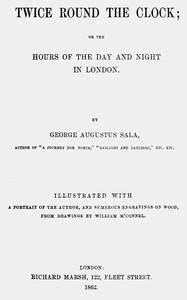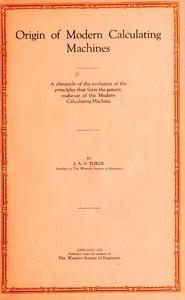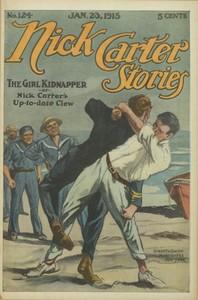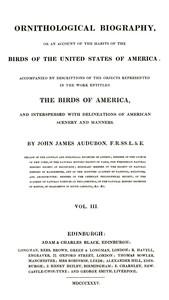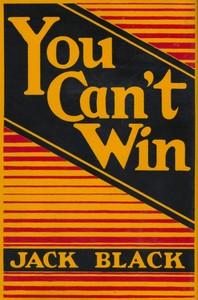|
|
Read this ebook for free! No credit card needed, absolutely nothing to pay.Words: 37171 in 5 pages
This is an ebook sharing website. You can read the uploaded ebooks for free here. No credit cards needed, nothing to pay. If you want to own a digital copy of the ebook, or want to read offline with your favorite ebook-reader, then you can choose to buy and download the ebook.

: Twice round the clock; or The hours of the day and night in London by Sala George Augustus McConnell William Illustrator - London (England) Social life and customs 19th century@FreeBooksThu 08 Jun, 2023 to as Mrs. Van Umbug's husband. If you ask the coachman in the adjacent mews whose horses are those the helper is harnessing to the brougham, he will probably answer, "Mrs. Van Umbug's." The servants in the house in Gladiator Street, talk continually of "Missus" , but scarcely ever mention "Master." The tradespeople usually send in their bills to Mrs. Van Umbug; and it is certain that it is that lady who issues the invitations and receives the company at her Thursday conversaziones. Mr. Van Umbug, M.P., is scarcely ever seen at those gatherings, and when he is, rarely, manifest, it is in a very meek and subdued manner. He sneaks in and out as if the house didn't belong to him , and appears desperately afraid of the portly man in black with the white Berlin gloves who hands round the tea and coffee. This present Thursday at Mrs. Van Umbug's is a great literary one. The lions of literature are present in the flesh. Here is the distinguished Snortup, author of "The Common Objects of the Back-yard," "Geology in Joke," "Trigonometry Judged by Taxation," "The Extinct Animals of Eel-pie Island," and other erudite and ponderous scientific works. Snortup, who is a Doctor of Philosophy of the University of Schinckelbrauen, is a heavy man, with a black wig and a huge black satin stock, in which gleams a cameo bearing a curious resemblance to an oyster. He snuffs a great deal, and when he speaks he does not belie his name, but literally snorts. Near him is young Twiddles, with his auburn hair, his turn-down collar, and Byron tie, his speckled silk stockings and low shoes, his baby face and falsetto voice. Twiddles, who writes under the pseudonym of Swedenborg Scanderberg, has just published a volume of poems of the ultra-spasmodic order. In passages replete with burning eloquence, he has spoken of the "moonbeam's frosty rime, that hoars the head of nature, and makes last summer's sapling patriarchal white." His grand passage in "Ladye Babbynetta," in which he alludes to "the hot and rabid ice, that burns and sears by force of congelation," has been enthusiastically spoken of by Sidney Muffins, editor of the "Tomfool" weekly journal. Muffins is not a poet yet, but he hopes to be one when his whiskers grow and he has read "Cassel's Popular Educator." Meanwhile, he swears by Twiddles, and fiercely abuses, in print and in person, those who can't avoid the conviction that Twiddles is a donkey. Besides Mr. O'Roarer and his fellows already described, there is the Honourable Simperkin Blushington, that pleasing novelist and Oriental traveller. A little to the left, and scowling at the Honourable Simperkin fearfully, is Leathers, the author of "A Jaunt to Jericho" and "Seven Years in a Penal Settlement." Leathers wears a huge cut-velvet waistcoat, that looks like a fragment from some tapestried window-curtain. He is not at all clever, is Leathers--has no humour, observation, or power of description; but he has got a name among the book-selling trade, somehow, as a "good travelling hand"--a safe man for two volumes royal octavo with plates and a map--and so soon does any foreign country, from Canton to British Columbia, begin, from political or other causes, to attract public attention, so soon is Leathers commissioned to write his two bulky volumes of travels therein. Ill-natured people say that he keeps particulars relative to geography pigeon-holed in his library, and that he never went further than Boulogne, in the days of the five-shilling fares; but Leathers gets his price, and can afford to laugh at the evil-speaking. Bonassus, the publisher, of Bumpus Street, will have Leathers's portrait in the next edition of "Rambles in the Island of Perim." I am sure it is very ungallant in me to have been so long silent regarding the ladies who grace the literary conversazione with their presence. A man must be, indeed, a brute who could pass over the charms of Miss Withers, aged forty, authoress of "Crackings of the Heartstrings," "Shudderings of the Soul," "Crinklings of the Spirit-skin," "Eyeball Darts," and other pathetic lyrics. Miss Withers once kept a boarding-school, but gradually languished into poetry. She attained considerable celebrity in the time of the Annuals, but on the downfall of those amusing ephemerides, she betook herself to history, and is the writer of "Lives of the Wet Nurses of the Princesses of England," "Memorials of celebrated Bedchamber Women," and "The Silversticks in Waiting before the Conquest"--all works replete with critical acumen, and brimful of historical lore, though following a little too closely in the footsteps of a lady who has written an admirable and genuine History concerning some Queens of England. Miss Withers, however, has done very well for her publishers and for herself. She is one of those authoresses who, dying, would never wish to blot out a line they had written, simply because Heaven has gifted them with a happy mental cecity that prevents them from discerning that nine-tenths of their works should never have been written at all. You may see Miss Withers any day in the British Museum Reading-room, vigorously compiling away at the desk marked "for ladies only." She has piles of books around her; she makes the attendants' lives a torment to them with the flying squadrons of book-tickets she deposits at the bar; she walks about the india-rubber flooring with one pen behind her ear and another in her mouth. She, being tall, bony, severe of aspect, and much given to snuff-taking, is generally feared by the Museum frequenters. She wrenches volumes of the catalogue from mild young clergymen in spectacles and M. B. waistcoats. She follows line after line of the printed page with her heavy inkstained forefinger. Once Dedman the pedigree-hunter, who was filling up his ticket opposite Miss Withers, was venturous enough to ask her the day of the month. She called him, in a hollow voice, "fellow," on the spot, snuffed indignantly, and afterwards spoke of him to the attendant with the red moustache as an "impertinent jackanapes." The only person with whom she condescends to be conversational in the reading-room, is Eglintoun Beaverup, the famous novelist, satirist, poet, traveller, Quarterly Reviewer, essayist, epigrammatist and politician, who stood for the Macbeth district of burghs last general election, and proved in an article in the "Rampant Magazine," that the present Duke of Sennacherib's grandfather was a pork butcher in Liquorpond Street, and that Sir Ranulph De Brie's papa owed his baronetcy to a loan of ten thousand pounds, advanced by him to the Prince Regent on the security of a pinchbeck watch, which that improvident scion of royalty, having no other available pawnable property, had borrowed for the nonce from one of the helpers in his stable. Beaverup is himself descended from Brian de Bois Guilbert on the father's side, and from the original Thane of Cawdor, who slew Duncan, on that of the mother. Miss Withers will sometimes exchange deadly whispers with him relative to the mushroom characteristics of our modern peerage, and the departed glories of soccage and villeinage, infang theof and outfang theof. Of course there are some titled folks at Mrs. Van Umbug's conversazione: it would not be complete without a literary lord--a harmless nobleman, generally, who has translated Horace, invented a new metre, or discovered a new butterfly; and a literary lady--if separated from her husband all the better, who paints him in the darkest of colours, as the hero of every one of her novels. And, equally of course, Ethelred Guffoon is here. Ethelred Guffoon is everywhere. He is one of Mrs. Van Umbug's special favourites. She calls him by his Christian name. He hunts up new lions for her; occasionally he officiates as peacemaker, and prevents the lions from growling and fighting among themselves. He rushes from Mrs. Van Umbug's conversazione to the Pontoppidan Theatre, to see a new face, which he must criticise; after that he will sit up half the night to review Mr. Gladstone's Homer, for the "Daily Scratcher," and will be at Somerset House by punctual office hours the next morning. A man of the age, Ethelred Guffoon--a man of the time, a good fellow, but frivolous. I wonder whether the celebrities one sees at this shadowy conversazione really represent the literary world--the real people who write the books and think the thoughts. I am afraid they do not. I fear that to find the princes of the pen, the giants of the land of letters, I must go further afield. Lo, here is Great Tom of Chelsea, sitting cosily, in his back parlour, smoking a pipe of bird's-eye with Eglintoun Beaverup, and telling him he is about having his ceilings whitewashed. Here is Lord Livy poring over Restoration and Revolution broadsides by his reading-lamp in his lonely chambers in the Albany;--no, not lonely, the spirits of the old historic men come from their dusty shelves and clap him on the shoulder, and cry, "Go on and prosper, Thomas Babington, Lord Livy." The great Mr. Polyphemus, the novelist, is bidden to the Duke of Sennacherib's, and as he rolls to Sennacherib House in his brougham, meditates satiric onslaughts on "Tom Garbage" and "Young Grubstreet"--those Tom Thumb foes of his--in the next number of the "Pennsylvanians." Mr. Goodman Twoshoes is reading one of his own books to the members of the Chawbacon Athenaeum, and making, I am delighted to hear, a mint of money by the simple process. Goldpen, the poet, has taken his wife and children to Miss P. Horton's entertainment; Bays, the great dramatist, is sitting in the stalls of the Pontoppidan Theatre listening with rapt ears to the jokes in his own farce; and Selwyn Cope, the essayist, is snoring snugly between the sheets, having to rise very early to-morrow morning in order to see a man hanged. And where are the working-men of literature, the conscripts of the pen, doomed to carry Brown Bess, for sixpence a day, all their lives? Where are Garbage and Grubstreet? In the worst inn's worst room, with racing prints half hung, the walls of plaster and the floors of sand, at once a deal table but stained with beer, sits Garbage playing four-handed cribbage with an impenitent hostler, a sporting man who has sold the fight, and a potboy who is a returned convict? Sits he there, I ask, or is he peacefully pursuing his vocation in country lodgings? And Grubstreet, is he in some murky den, with a vulture's quill dipped in vitriol inditing libels upon the great, good, and wise of the day? Wonder upon wonders, Grubstreet sits in a handsome study--listening to his wife laughing, over her crochet work, at Mr. Polyphemus's last attack on him, and dandling a little child upon his knee! Oh! the strange world in which we live, and the post that people will knock their heads against! Thus circumstanced, I feel it becoming my degree to stay on the outside of great houses, and, herding among the crowd and the link-men, to witness the setting down and the taking up of the carriages coming to or going from evening parties. It has always been my lot so to stand on the kerb, to be a continual dweller on the threshold. I have stood there to see people married, to see people buried, and have murmured: "My turn must come next, surely;" but my time has not come yet. A king has patted me on the head, and I have sate, as a child, on the knee of the handsomest woman in Europe. I have been on the brink of many a precipice; I have attained the edge of many a cloud. But I have stopped there. I have always been like the recalcitrant costermonger's donkey, "going for to go," but never accomplishing the journey in its entirety. Who is dead by this time, most probably; but I can still stand by the side of his successor, at the door of the great house, by the lamp and lantern's glare, and see the gay company pass in and out. How the horses champ! how the dresses rustle! how the jewels shine! and what fair women and brave men are here congregated! Messrs. Weippert's or Collinet's band are upstairs; Messrs. Gunter's men have brought the ices; there are flirtations in the conservatories, and squeezings of hands interchanged on the stairs. Vows of love are spoken, flowers from bouquets are given; and is it not, after all, the same old, old story, that boys and girls will love one another, and that the old people will look on with pretended severity, but with real contentment in their hearts, and that there will be present a few jealous and cankered ones, who will look on to envy the others because they are so happy? Drive envy from your hearts, ye who ride not in gilded chariots, and move not in the "fashionable circles." There is as much truth, love, and gaiety at a "sixpenny hop," between maid-servants and journeymen bakers, as at the most refined evening parties. MIDNIGHT.--THE HAYMARKET, AND THE SUB-EDITOR'S ROOM. But we have come to the complexion of midnight, and the hour must be described. It is fraught with meaning for London. You know that in poetical parlance midnight is the time when church-yards yawn , and graves give up their dead. And there be other grave-yards in London town--yards where no tombstones or brick vaults are--that at midnight yawn and send forth ghosts to haunt the city. A new life begins for London at midnight. Strange shapes appear of men and women who have lain a-bed all the day and evening, or have remained torpid in holes and corners. They come out arrayed in strange and fantastic garments, and in glaringly gaslit rooms screech and gabble in wild revelry. The street corners are beset by night prowlers. Phantoms arrayed in satin and lace flit upon the sight. The devil puts a diamond ring on his taloned finger, sticks a pin in his shirt, and takes his walks abroad. It is a stranger sight than even the painter Raffet imagined in his picture of Napoleon's midnight review, and it is, I think, a much better thing to be at home and in bed, than wandering about and peeping into the mysteries of this unholy London night life. I know this book well; have conned its grim pages, and studied its unwholesome lore, attentively. But I am not about to make you a too-recondite participant in my knowledge. Were it not that the appointed hours were meted out to me, and that from one of the hours--midnight--the Haymarket is inseparable, the wicked street should find no place here; but I must be faithful to my trust, and the bad thoroughfare must be in part described. Free books android app tbrJar TBR JAR Read Free books online gutenberg More posts by @FreeBooks

: Nick Carter Stories No. 124 January 23 1915: The girl kidnaper; or Nick Carter's up-to-date clew. by Carter Nicholas House Name Jenkins Burke - Popular literature Periodicals; Detective and mystery stories American Periodicals@FreeBooksThu 08 Jun, 2023
|
Terms of Use Stock Market News! © gutenberg.org.in2025 All Rights reserved.

